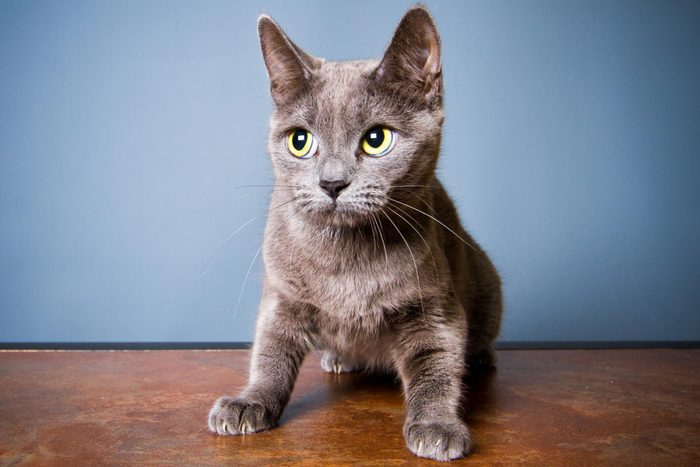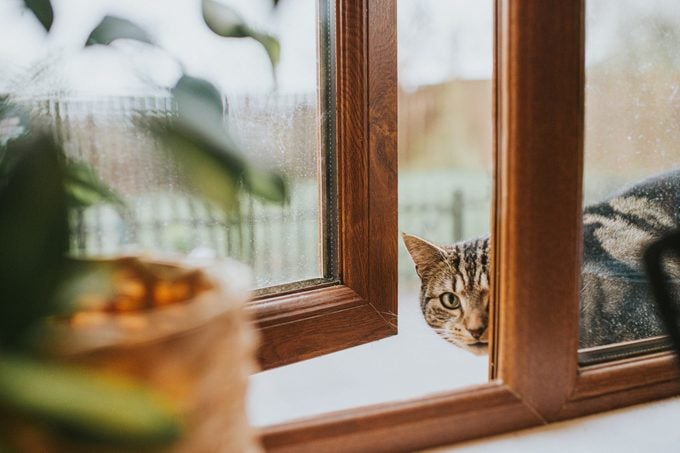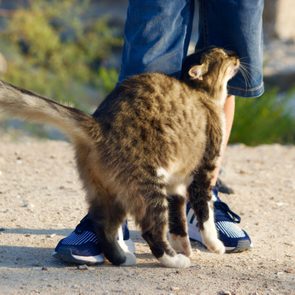Cat Anxiety: 6 Reasons Your Cat May Be Stressed, and What to Do About It
Updated: Dec. 19, 2023

There's a good chance you're accidentally stressing out your kitty. Here's how to change that and keep your cat's anxiety at bay.
An anxious cat isn’t ideal for the pet owner or feline. Not only is kitty feeling stressed out about the world around her, but this situation can also wreak havoc on your household. For example, cats with anxiety can exhibit destructive cat behaviors such as peeing outside the litter box or getting into areas they shouldn’t. Cat anxiety can also cut into your ability to get some quality bonding time with your pet. Also, find out how long can you leave a cat alone and if cats get jealous.
While this can be a challenging problem to deal with and it won’t magically go away overnight, it is by no means impossible to overcome. We asked cat experts to weigh in on the issue—and provide some possible solutions to save everyone’s sanity. When you’re up to speed, find out if your cat’s hissing is related to anxiety, as well as if cats can cry.
While you’re at it, also find out why scruffing a cat is a big no-no!
Signs your cat is dealing with anxiety
Can cats have anxiety disorders? Yes, and it’s perhaps more common than you think. While some signs of cat anxiety are clear, others are more subtle, notes Jessica Herman, DVM, a veterinarian at Fuzzy Pet Health.
Obvious signs of cat anxiety may include:
- Increased aggression
- Hissing
- Excessive vocalization (especially if it’s more than usual)
- Pacing
- Extreme mood changes
- Becoming needier or afraid to leave your side
Subtle signs of cat anxiety may include:
- Not using the litter box
- Hiding
- Trying to escape
- Lethargy
- Change in appetite (and therefore, weight)
- Digestive issues such as diarrhea
- Overgrooming, which may create bald spots or skin sores
Keep in mind that these various stressors can also trigger cat depression.
Common reasons why cats experience anxiety

Cats tend to be sensitive creatures who are highly attuned to their surroundings. Anything that disrupts the status quo can trigger their anxiety and lead to the above traumatized-cat symptoms, notes Dr. Herman. Here are a few common reasons for feline anxiety:
- Moving to a new home: Whether you’re moving across the street or across the country, learning a new space is highly upsetting for cats. They’ve scoped their old territory, left their marks, and found their favorite spots. Needing to repeat all the above can cause quite a bit of anxiety for them. Fortunately, this anxiety will subside as they get used to their new abode.
- Introducing or losing a pet or family member: Maybe you just had a baby or recently lost a sweet pet. Whatever the case may be, any shift in home dynamics can trigger cat anxiety. Cats don’t do well with change to begin with, and now, they may also be mourning their previous friend.
- Change to their daily routine: The two examples above can majorly shift your cat’s routine, which is cause for mourning as well. But even small adjustments, such as changing their daily feeding time or play schedule, can trigger cat anxiety. Sometimes something as simple as rearranging the furniture can upset your cat. Here are more things you do that your cat hates.
- Boredom: Though expert loungers, cats do require mental and physical stimulation; without it, they can experience anxiety and engage in destructive behavior, notes Dr. Herman. Cuddles, toys, and one-on-one time can help.
- Pain, discomfort, or illness: Physical issues are common sources of cat anxiety. They can run the gamut, from a hurt paw to an upset tummy to a more serious medical problem. When a cat isn’t 100 percent herself, she likely feels vulnerable, on guard, and without all her defenses. That would cause anyone to feel a bit of anxiety! Make sure you’re not ignoring these silent signs your “healthy” cat is actually sick.
- Separation anxiety: While we often think of dogs as the animals most attached to their owners, felines deal with this problem as well. In fact, cat separation anxiety may be more common now that COVID-19 restrictions are lifting and people are returning to work and traveling. It’s important to ease your cat into the idea that you may be away from home more often, and leaving behind your scent via a shirt or blanket may help them feel calmer. If you’re planning to bring your cat along on your next trip, here’s what you need to know about flying with a cat.
Are some cats more anxious than others?
You might have noticed that some cats saunter around without a care in the world, while others are known for being skittish “scaredy cats.” And this makes sense because cats’ personalities and life experiences are all different.
“Just like humans, some cats are more anxious than others,” says Mikel Delgado, PhD, a postdoctoral veterinary fellow, certified applied animal behaviorist, and resident cat expert for the pet food company Smalls. “This is due in part to genetics, so some cats just might be born a bit more prone to anxiety. At the same time, socialization at a young age will have an impact on how sensitive a cat’s stress response becomes.”
For that reason, Delgado says it’s ideal for kittens to get lots of gentle, positive exposure to different people, animals, types of handling, and experiences—such as being in a carrier—when they are young. This early experience will help them cope better with change when they are older. While we’re on the subject, here’s how to get your cat in a carrier without getting clawed.
How do I help my cat with anxiety?
All cats want to feel a sense of safety, control, and choice in their daily lives and interactions with people and other animals, notes Delgado. Keep this in mind as you work to relieve your cat’s anxiety.
“Never punish a cat for exhibiting signs of anxiety, as this could make the anxiety worse and cause more unwanted behavior. You want to make them feel safe and loved,” says Dr. Herman. “Sticking to a routine will help. Feeding and playing with your cat at a similar time each day will help create security. Creating a mentally stimulating environment will help, as well.” For example, you might add cat perches and scratching posts to your home, and/or provide an array of cat toys, including food puzzles and interactive mouse feeders. In that same vein, make sure your cat has a quiet, safe place to escape.
Another important thing you can do is scoop the litter box daily and replace the litter every week. That’s actually one of the big things your cat wants from you. An unclean litter box can be a huge source of stress for a cat. On that note, Delgado says that you may need to add more litter boxes and food dishes to soothe a stressed cat, especially if they’re in a multi-cat home. Every cat should have their own.
“Calming cat pheromone products can help, as well,” says Dr. Herman. “Feliway spray, diffusers, and wipes mimic a natural ‘happy feeling’ feline pheromone for your cat and can soothe, calm, and relax him or her.”
Additionally, according to a new study, cats like baby talk. AKA, speaking in a high-pitched tone may help get your cat’s attention.
When to see a veterinarian
You should consult your vet any time you notice a significant change in your cat’s behavior, personality, or body language. That includes exhibiting the signs of anxiety outlined above, as well as a change in how much your cat is sleeping. “It’s also important to recognize that anxiety is more pervasive than short-term fear. Some cats will hide briefly after a loud noise or a visitor, but they return to ‘normal’ shortly afterward,” explains Delgado. “Anxiety tends to be more ongoing and doesn’t always have a clear trigger. Just like you would take your cat to the vet if they had a broken leg, anxiety can lead your cat to suffer and requires medical treatment.”
During your appointment, your vet will likely ask for a detailed history of your cat’s behavior and perform a physical examination before determining the best course of action. “Your vet may recommend medication or behavior-modification techniques,” says Delgado, “or [they may] refer you to a behavior specialist who can help you assess your cat’s situation and environment for changes.”
Whether your vet prescribes your cat anxiety meds or not, you’ll definitely want to create a routine for your cat, as well as environmental enrichment. That’s ultimately what will help make your cat calmer. Next, learn the other signs it’s time to take your cat to the vet.
Sources:
- Jessica Herman, DVM and veterinarian at Fuzzy Pet Health
- Mikel Delgado, PhD, postdoctoral veterinary fellow, certified applied animal behaviorist, and resident cat expert for Smalls





















